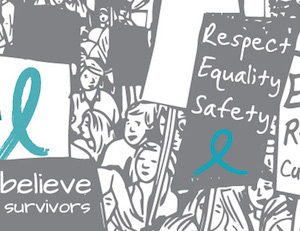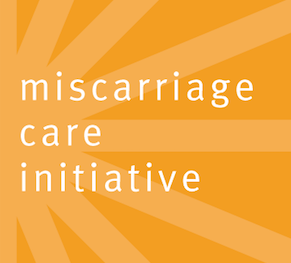Aug 14

Help Us Protect Access to Sexual and Reproductive Health Care Today!
 April is Sexual Assault Awareness Month. Sexual violence includes a range of actions and behaviors and happens to people of all ages, races, ethnicities, genders, sexual orientations, and incomes. It happens every day. This is a gendered form of violence: in the U.S., one in five women and one in 71 men report experiencing rape at some time in their lives.
April is Sexual Assault Awareness Month. Sexual violence includes a range of actions and behaviors and happens to people of all ages, races, ethnicities, genders, sexual orientations, and incomes. It happens every day. This is a gendered form of violence: in the U.S., one in five women and one in 71 men report experiencing rape at some time in their lives.
For people with a history of sexual trauma, accessing reproductive health care, especially pelvic exams, may trigger PTSD symptoms. The Reproductive Health Access Project teaches techniques of trauma-informed care that can lead to easier pelvic exams for patients who are survivors of sexual violence.
Studies show that trauma survivors want their clinicians to ask about sexual trauma before the exam (that is, while the patient is clothed and seated). During the exam, patients prefer that the clinician listens, anticipates each step of the procedure, and affirms the patient’s control over the exam. For example, giving patients the option of self-inserting the speculum has been shown to lower patients’ anxiety and pain.
Patient-centered techniques we teach that lower anxiety include:
And, most importantly, if the patient does not want to continue the exam, the clinician should stop, inquire about the patient’s needs, and proceed only when the patient is ready.
You can read our Contraceptive Pearl on Trauma-informed Pelvic Exams on our website. Learn more about sexual violence and about the April campaign to raise awareness to the issue at the National Sexual Violence Resource Center.
 One in three women will have an abortion in her lifetime. But, there are many factors restricting access to abortion care: restrictive abortion laws, lack of trained clinicians, and financial cost to name a few. With your help, RHAP works to expand access to abortion care by supporting and training primary care clinicians nationwide.
One in three women will have an abortion in her lifetime. But, there are many factors restricting access to abortion care: restrictive abortion laws, lack of trained clinicians, and financial cost to name a few. With your help, RHAP works to expand access to abortion care by supporting and training primary care clinicians nationwide.
Over the past few months, we have seen both an increase in abortion restrictions and more interest from committed clinicians and health care organizations to push back against the current anti-abortion tide and work to provide abortion care. We are dedicating our spring fundraising drive to raising funds to support clinicians and health care organizations who provide abortion and miscarriage. With your help, we can assist these clinicians, who are often in remote parts of the country, to offer safe, scientifically sound, and readily accessible reproductive health care to those who need it most.
This April and May, we ask that you join us in our efforts to support pro-choice clinicians to provide abortion and miscarriage care. Your donations are 100% tax-deductible.
 Since the election, our Reproductive Health Access Network has grown by over 300 people and we’ve seen an uptick in the number of clinicians who want to engage in clinical advocacy now more than ever. This month, we are highlighting Dr. Sharon Liner, a family planning and abortion provider in Ohio. In addition to providing family planning and abortion services to her patients, Dr. Liner is becoming a strong clinical advocate and leader within her community and nationally.
Since the election, our Reproductive Health Access Network has grown by over 300 people and we’ve seen an uptick in the number of clinicians who want to engage in clinical advocacy now more than ever. This month, we are highlighting Dr. Sharon Liner, a family planning and abortion provider in Ohio. In addition to providing family planning and abortion services to her patients, Dr. Liner is becoming a strong clinical advocate and leader within her community and nationally.
Immediately after graduating from her family medicine residency program, Dr. Liner took a job at the local Planned Parenthood. Since then, most of her practice has been in family planning and abortion care. In addition to providing patients with these critical services, Dr. Liner is also a strong advocate for accessible, safe, and comprehensive reproductive health care for all.
Dr. Liner became more outspoken after working with patients for many years and understanding the difficulties they had to face. “You see a lot of organizations and programs that encourage patients to speak out and tell their stories, but it can be really difficult for our patients to do this- there’s stigma and it’s very personal.” After attending a Doctors for America Meeting, Dr. Liner realized that she could use her clinical experience to speak up and advocate for her patients. As a physician, she learned that her voice holds power in both the public eye and at the legislative/government level. Last year, Dr. Liner participated in Physicians for Reproductive Health’s Leadership Training Academy, which helped her hone her skills as an advocate.
When asked if she has any advice for clinicians looking to amp up their advocacy efforts, Dr. Liner says that preparation is key to good communication. Being prepared and knowledgeable about the issues is essential for effective storytelling. It’s also important to understand that “advocacy” can take on many forms. In addition to front-facing activities such as writing letters to the editor, publishing online articles, testifying, and lobbying, advocacy also takes place within professional organizations and in the provider community. For Dr. Liner, even speaking about her work with colleagues across medical disciplines has helped her build bridges; she’s found that people are actually very supportive and understand how important it is for patients to have access to family planning and abortion services.
It may feel difficult to find a starting point when thinking about clinical advocacy, especially since “advocacy” is a broad term and includes such a variety of activities. Per Dr. Liner, becoming a clinical advocate can be a gradual process, and it’s okay to start small. For example, engaging in discussions with your medical colleagues about your work is a significant step towards developing your skills and building supportive networks. Become more involved in your hospital board, professional organizations (such as the American Academy for Family Physicians), and community groups. “Learn to use all of the resources at hand, and help make sure that we [as clinicians] don’t remain a silent majority when it comes to women having the health care access that they need, when they need it.”
 Applications for the 2017-2018 Miscarriage Care Initiative are now available! The Miscarriage Care Initiative is an effort by the Reproductive Health Access Project to integrate comprehensive management of early pregnancy loss into primary care settings. Our vision is to support family physicians and clinic administrators to integrate all three forms of miscarriage management—expectant, medication, and manual vacuum aspiration (MVA) management—into their clinical practice.
Applications for the 2017-2018 Miscarriage Care Initiative are now available! The Miscarriage Care Initiative is an effort by the Reproductive Health Access Project to integrate comprehensive management of early pregnancy loss into primary care settings. Our vision is to support family physicians and clinic administrators to integrate all three forms of miscarriage management—expectant, medication, and manual vacuum aspiration (MVA) management—into their clinical practice.
This year, through the Miscarriage Care Initiative, one organization will receive intensive support from RHAP to integrate and expand miscarriage treatment into a primary care practice site. Each applicant organization will identify a “Clinical Champion,” who will be the primary point of contact and lead program implementation at the practice site.
Please click here for more details on the Miscarriage Care Initiative and how to apply. If you have any questions, email the Miscarriage Care Initiative Program Manager, Laura Riker, at laura@reproductiveaccess.org. Applications will be accepted from April 10th through June 1st, 2017. Submissions will be reviewed on a rolling basis so we encourage you to apply early.
Your gift allows us to train and support health care providers across the United States so they can offer patients compassionate and comprehensive care.
Aug 14
